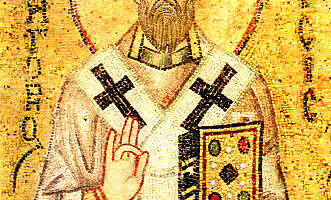There is a consensus among biologists about the truth of the theory of evolution. The same thing happens among historians in respect to the existence of Jesus as a historical person (I don’t deal here with religious aspects).
However, some religious fundamentalists, dismissing the scientific community, reject evolution, because they have a literal interpretation of the Genesis (biblical story of creation). Thus, they are known as creationists.
On the other hand, some radical atheists (usually militant anti-theists), ignoring the consensus within historians, claim Jesus never existed at all. Since they defend the “Christ Myth Theory”, they are called mythicists.
Even though there are clear distinctions between scientific and historical evidences, it’s still curious to notice how such opposed extremes behave themselves in such similar manner. Thinking about that, I’ve decided to create the following dialogues to better describe this scenario:
TWO SIDES OF THE SAME COIN: THE STUBBORN IGNORANCE OF RADICALS
I –
— Pay attention, Lucas. — Leonardo was trying again to convince his creationist friend to accept the Theory of Evolution.
— For what? You will tell me the same things you always do.
— Forget our previous conversations. Let’s pretend it’s the first time, please.
— Ok… Go on — said a bored Lucas.
— Thanks. First, you must know that practically all specialized scholars in the fields related to this subject defend evolution… — Leonardo was talking until he was interrupted by Lucas.
— Wait a second. I’ve seen several articles in newspapers and magazines with scholars against evolution. There is even a documentary about this.
— Lucas, those aren’t scholars in the field; they are practically laymen without the proper training and/or knowledge about this subject.
— But there are even college professors.
— From other areas. To my knowledge, there is not in the western world a single full professor in biology who denies evolution and defends creationism.
— That doesn’t say much. Since they are probably all atheists, they are likely biased. Of course they will defend evolution.
— They aren’t all atheists. Lucas. There are catholic, Jewish, protestant, agnostic, and atheists scholars, and they all treat evolution as a scientific fact.
— They do it for money then. Think about it: they must defend that, because it’s their livelihood. If they admitted it was all a farce, they would have no job and would not be relevant at all.
— On the contrary, Lucas. Think about it: the person who would prove this supposed falsehood of evolution would make a revolution and would considered a genius in the field. Who wouldn’t want this kind of fame?
— I’m not convinced. Maybe they don’t give a chance to others because they are afraid of losing their relevance. But ok, let’s assume that there really is such consensus and good faith among scholars. That does not prove evolution at all. They can be all wrong? Do you agree?
— Yes. But an effective consensus of qualified experts constitutes meeting an initial burden of evidence, because it is far more unlikely that an incorrect argument would persuade a hundred experts than that it would persuade only one; and it’s far more unlikely that it would persuade any expert than that it would persuade even a hundred amateurs.
— Not when there is a clear bias among those so called experts. Anyway, none of that is evidence. Where are they?
— Well, we have several evidences. Like, for example, the fossil record, the geologic column, that shows the succession on the rocky formation that in millions of years shaped the crust of the earth, and that have fossils in a progressive sequence that shows a gradual transition, from the simplest to the most complex form of life. There’s homology, similarities in shape and function in several species anatomies. There’s the universal genetic code. There’s also…
— Leonard was still explaining when Lucas said:
— I don’t believe in none of that. Personal and biased interpretations with the purpose to get to a pre-desired conclusion. Who can guarantee that those things are true? Where’s the evidence?
— You interrupted me. May I go on?
— No, do this: show me a monkey or a horse becoming a human being.
— That’s not how evolution works, Lucas. Man “did not come from monkey”, they both just have common ancestors. The evolutionary process might take thousands to millions of years. I don’t have to show that happening right now to prove evolution is real.
— Rather convenient. So all that, like the name says, is just a theory.
— A scientific theory, not just a theory in popular meaning. Like I’ve explained, evolution is a scientific fact, because it’s based on evidences. It’s the best explanation there is for the development of life.
— The best, but not necessarily the truth. When you call it a fact, it kills any type of discussion. Unfortunately, I can tell you’re rather radical and have your mind set. It’s hard to argue like this.
— Is that what you have understood after everything I’ve said? If you want, I can explain it with more details. — said a patient Leonardo.
— No need. You have not convinced me. You have your opinion, I have mine. Let’s agree to disagree.
— Ok, Lucas, ok. — Leonardo gave up.
— Don’t worry, my friend. A couple years from now, you will think “How I could not tell that Lucas was right all along?”
— I really, really doubt that, my friend…
II-
— Pay attention, Lucas. — Leonardo was trying again to convince his mythicist friend to accept that there really was a historical Jesus.
— For what? You will tell me the same things you always do.
— Forget those conversations. Let’s pretend it’s the first time, please.
— Ok… Go on — said a bored Lucas.
— Thanks. First, you must know that practically all specialized scholars in the fields related to this subject defend that Jesus existed… — Leonardo was talking until he was interrupted by Lucas.
— Wait a second. I’ve seen several articles in newspapers and magazines with scholars against it. There is even a documentary about this.
— Lucas, those aren’t scholars in the field; they are practically laymen without the proper training and/or knowledge about this subject.
— But there are even college professors.
— Scholars from other areas. There isn’t a single full college professor in the whole western world, specialized in the fields involving this matter, who denies the existence of Jesus as a historical person.
— That doesn’t say much. Since they are probably all Christians, they are likely biased. Of course they will defend this.
— They aren’t all Christians, Lucas. There are catholic, Jewish, protestant, agnostic, and atheist scholars, and they all agree Jesus existed.
— They do it for money then. Think about it: they must defend that, because it’s their livelihood. If they admitted it was all a farce, they would have no job and would not be relevant at all.
— On the contrary, Lucas. Think about it: the person who would prove this supposed inexistence of Jesus would make a revolution and would considered a genius in the field. Who wouldn’t want this kind of fame?
— I’m not convinced. Maybe they don’t give a chance to others because they are afraid of losing their relevance. But ok, let’s assume that there really is such consensus and good faith among scholars. That does not prove Jesus existed at all. They can be all wrong? Do you agree?
— Yes. But an effective consensus of qualified experts constitutes meeting an initial burden of evidence, because it is far more unlikely that an incorrect argument would persuade a hundred experts than that it would persuade only one; and it’s far more unlikely that it would persuade any expert than that it would persuade even a hundred amateurs.
— Not when there is a clear bias among those so called experts. Anyway, none of that is evidence. Where are they?
— Well, we have several evidences. Like, for example, the epistles of Paul (several almost universally considered authentic among scholars), who knew personally knew Jesus followers like Peter and James (brother of Jesus). Paul’s writings are consistent of the time period and its events. There’s also the gospel, because there is several information there that pass important criterion in the study of history, like embarrassment (for instance, the Jews would never invent a crucified Messiah) and multiple attestation. We have non-Christian sources: references to Jesus can be found in the writings of Roman Historian Tacitus and Jewish historian Josephus There’s also… — Leonard was still explaining when Lucas said:
— I don’t believe in none of that at all. Personal and biased interpretations with the purpose to get to a pre-desired conclusion. Who can guarantee that those things are true? Where’s the evidence?
— You interrupted me. May I go on?
— No, do this: show me Jesus bones or the original sentence against him.
— That’s not how the study of history works, Lucas. You must analyze the body of evidences together. I don’t have to show any of that to prove Jesus existed.
— Rather convenient. So all that is just stories.
— History, not just stories. Like I’ve explained, the existence of Jesus is a historical fact. It’s the best explanation there is for that man and period of time.
— The best, but not necessarily the truth. When you call it a fact, it kills any type of discussion. Unfortunately, I can tell you’re rather radical and have your mind set. It’s hard to argue like this.
— Is that what you have understood after everything I’ve said? If you want, I can explain it with more details. — said a patient Leonardo.
— No need. You have not convinced me. You have your opinion, I have mine. Let’s agree to disagree.
— Ok, Lucas, ok. — Leonardo gave up.
— Don’t worry, my friend. A couple years from now, you will think “How I could not tell that Lucas was right all along?”
— I really, really doubt that, my friend…



